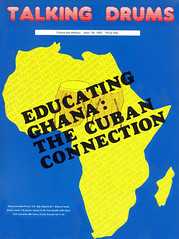Lessons Of Nigeria Elections
I was very delighted to have the opportunity of reading the very first issue of the "Talking Drums' Magazine. I followed closely the article on the Nigeria elections. After the coups and revolutions in West Africa. I was really scared and had premonitions of a tragedy after the elections. One can imagine my delight when the elections came off with only minor incidents.I was beginning to think that probably, as the Western World has portrayed, Africans cannot govern themselves efficiently but Nigeria is setting the example that at least one African country can conduct peaceful constitutional government.
I hope "Talking Drums" will be sold in Nigeria. It will be really tragic if the selfishness and greed of a handful of politicians and public officials should pave the way for the trigger-happy soldiers to take over this new democratic experiment and destroy free enterprise and progress that have elevated Nigeria in the eyes of the world.
Rita Osei London
More Room At The Top
Dear Editor,I bought a copy of "Talking Drums" from "Charlies" out of curiosity and I must say that the first issue made quite interesting reading. Elizabeth Ohene. certainly knows how to put across her views in the strongest way possible. with a bit of cynicism that cannot be ignored.
I am looking forward to the second issue but could you include more news briefs from West Africa and other parts of Africa, a regular short story column, poems and more pages of sports?
If some of the stories could be embellished with good political cartoons it would surely enhance the magazine.
Yaw Brenya London
Hard Work, Answer To Economic Problems
Dear Editor,My thanks for the express delivery of "Talking Drums". I would like to comment on Mr. John Abugri's "Ghana's economic reconstruction efforts".
Much as I agree with some of what he said I have this to state. I believe he toyed simply with the colossal burden of the subject, contending that 'money must be found' to resuscitate our economy. In fact, he insisted that the money must be found without saying how and where. This is a mistake we have all made too often and which we ought to stop. Every government and everyone has money problems one way or another, and if there was a place where it is found, there would be few problems indeed.
For a long time now, Ghanaians have expected things to happen as a matter of course. University students riot if they do not get their loans by the 8th of December, without bothering to worry where the money comes from, or whether the loans are being paid by their predecessors. Secondary students expect to 'flow' through the educational system, provided they pass their exams, without finding how the 'system' is paid for. And people go into hospitals, demand health care without knowing how doctors and nurses are trained and paid. Is this not a pity with 12 million people being served by three good universities and a host of higher educational institutions?
Suppose there were a big lump of money available to the government from which all these are paid for, would it not get finished up? Well, let us face it, it is finished. Now the task is not one of finding money but working for it because there is nowhere to pick money up. If Ghanaians do not deserve the pain they are suffering, who deserves it? Apart from the lower echelons of the present generation every Ghanaian has a share of the blame. They do not know any glorious days to compare with these hard times anyway.
For quite some time we have had things easy. We had education, health, food, petrol, indeed, everything cheaply. Not only that, some of us engaged in wanton destruction and waste because we thought we were hurting the govern- ment. We can remind ourselves vividly of the days when Principal Secretaries used three of four cars each with full petrol tanks over weekends.
Their children smashed some of them in the gutters along the Ring Road in Accra and elsewhere. And the government bore the cost of these wanton waste and destruction. It even paid the heavy telephone bills they incurred on their personal use. Not everyone "chopped" big, but the chopping went on and those who could not chop looked on unconcerned.
If we did anything, it did not go beyond writing long essays condemning misbehaviour in high places. Sometimes we sacked them when it suited us, but installed worse ones because we liked them.
Basically our problem is insincerity to ourselves, ingratitude to our motherland and total disrespect for state institutions set up to look after us. If the I.M.F. gave us the money we need, or we 'found' it and we did not change this attitude towards national life, how could we be successful in anything?
Concerning who governs us, nobody - not even those who have workable answers to our problems has a right to govern. It is a responsibility to govern, never a right. If those who have workable answers to our plight, have been given the chance time and again. to do the job and they have failed, every Ghanaian owes it as a duty to himself and his countrymen to do what he or she can to put the country back on its feet. If anyone believes strongly, as Rawlings does, that sitting at the top will rebuild Ghana, he/she can go ahead, but mind how you get there, because depending on the method used Ghana will either be better or worse off.
Charlemagne Quist
London School of Journalism
